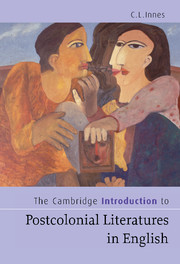Book contents
- Frontmatter
- Contents
- Preface
- Chapter 1 Introduction: situating the postcolonial
- Chapter 2 Postcolonial issues in performance
- Chapter 3 Alternative histories and writing back
- Chapter 4 Authorizing the self: postcolonial autobiographical writing
- Chapter 5 Situating the self: landscape and place
- Chapter 6 Appropriating the word: language and voice
- Chapter 7 Narrating the nation: form and genre
- Chapter 8 Rewriting her story: nation and gender
- Chapter 9 Rewriting the nation: acknowledging economic and cultural diversity
- Chapter 10 Transnational and black British writing: colonizing in reverse
- Chapter 11 Citizens of the world: reading postcolonial literature
- Notes
- Glossary of terms used (compiled by Kaori Nagai)
- Biographies of selected postcolonial writers (compiled by Kaori Nagai)
- Brief colonial histories: Australia, the Caribbean, East Africa, India and Pakistan, Ireland, West Africa (compiled by Kaori Nagai)
- Select bibliography
- Index
Chapter 3 - Alternative histories and writing back
Published online by Cambridge University Press: 05 June 2012
- Frontmatter
- Contents
- Preface
- Chapter 1 Introduction: situating the postcolonial
- Chapter 2 Postcolonial issues in performance
- Chapter 3 Alternative histories and writing back
- Chapter 4 Authorizing the self: postcolonial autobiographical writing
- Chapter 5 Situating the self: landscape and place
- Chapter 6 Appropriating the word: language and voice
- Chapter 7 Narrating the nation: form and genre
- Chapter 8 Rewriting her story: nation and gender
- Chapter 9 Rewriting the nation: acknowledging economic and cultural diversity
- Chapter 10 Transnational and black British writing: colonizing in reverse
- Chapter 11 Citizens of the world: reading postcolonial literature
- Notes
- Glossary of terms used (compiled by Kaori Nagai)
- Biographies of selected postcolonial writers (compiled by Kaori Nagai)
- Brief colonial histories: Australia, the Caribbean, East Africa, India and Pakistan, Ireland, West Africa (compiled by Kaori Nagai)
- Select bibliography
- Index
Summary
In his chapter on ‘National Consciousness’ in The Wretched of the Earth (1965), Frantz Fanon speaks of the importance of rescuing history from the colonizer's custody. In the face of European denials of any worthwhile native culture or history, he states:
the claims of the native intellectual are not a luxury but a necessity in any coherent programme. The native intellectual who takes up arms to defend his nation's legitimacy and who wants to bring proofs to bear out that legitimacy, who is willing to strip himself naked to study the history of his body, is obliged to dissect the heart of his people.
That ‘Africans did not hear of civilization for the first time from Europeans’, as Chinua Achebe declared, is a claim central to many works in the early stages of contesting a colonialist mentality. Achebe sees this as one of the main messages carried in his historical novels, Things Fall Apart (1958) and Arrow of God (1964), the first of which will be discussed in greater detail below. Perhaps because Africa has been the victim of the greatest denial and contempt, seen as the ‘Dark Continent’, and, as Fanon puts it, the home of ‘barbarism, degradation, and bestiality’, the affirmation of its cultural validity, the delineation of a history in its own terms, has been particularly the task of novelists throughout the African continent such as Achebe from Nigeria, Ayi Kwei Armah from Ghana, Assia Djebar from Algeria, Ngugi wa Thiong'o from Kenya and Solomon Plaatje from South Africa.
- Type
- Chapter
- Information
- Publisher: Cambridge University PressPrint publication year: 2007



